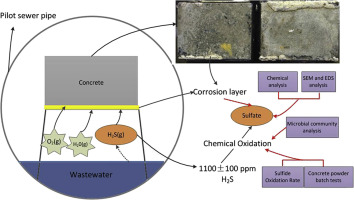Water Research ( IF 11.4 ) Pub Date : 2019-06-24 , DOI: 10.1016/j.watres.2019.06.062 Xuan Li , Liza O'Moore , Yarong Song , Philp L. Bond , Zhiguo Yuan , Simeon Wilkie , Lucija Hanzic , Guangming Jiang

|
Concrete corrosion in sewers is primarily caused by H2S in sewer atmosphere. H2S concentration can vary from several ppm to hundreds of ppm in real sewers. Our understanding of sewer corrosion has increased dramatically in recent years, however, there is limited knowledge of the concrete corrosion at high H2S levels. This study examined the corrosion development in sewers with high H2S concentrations. Fresh concrete coupons, manufactured according to sewer pipe standards, were exposed to corrosive conditions in a pilot-scale gravity sewer system with gaseous H2S at 1100 ± 100 ppm. The corrosion process was continuously monitored by measuring the surface pH, corrosion product composition, corrosion loss and the microbial community. The surface pH of concrete was reduced from 10.5 ± 0.3 to 3.1 ± 0.5 within 20 days and this coincided with a rapid corrosion rate of 3.5 ± 0.3 mm year −1. Microbial community analysis based on 16S rRNA gene sequencing indicated the absence of sulfide-oxidizing microorganisms in the corrosion layer. The chemical analysis of corrosion products supported the reaction of cement with sulfuric acid formed by the chemical oxidation of H2S. The rapid corrosion of concrete in the gravity pipe was confirmed to be caused by the chemical oxidation of hydrogen sulfide at high concentrations. This is in contrast to the conventional knowledge that is focused on microbially induced corrosion. This first-ever systematic investigation shows that chemically induced oxidation of H2S leads to the rapid corrosion of new concrete sewers within a few weeks. These findings contribute novel understanding of in-sewer corrosion processes and hold profound implications for sewer operation and corrosion management.
中文翻译:

高H 2 S浓度下混凝土排水管的快速化学诱导腐蚀
下水道中的混凝土腐蚀主要是由下水道中的H 2 S引起的。在实际的下水道中,H 2 S的浓度可以从几ppm到数百ppm不等。近年来,我们对下水道腐蚀的了解已大大增加,但是,在高H 2 S水平下对混凝土腐蚀的了解有限。这项研究检查了高H 2 S浓度下水道的腐蚀情况。根据下水道标准制造的新鲜混凝土试样在具有气态H 2的中试重力下水道系统中暴露于腐蚀性条件S在1100±100 ppm。通过测量表面pH,腐蚀产物组成,腐蚀损失和微生物群落来连续监测腐蚀过程。混凝土的表面pH从10.5±0.3降低至3.1±0.5 20天之内和此正好与3.5±0.3毫米年的迅速腐蚀速率-1。基于16S rRNA基因测序的微生物群落分析表明腐蚀层中不存在硫化物氧化微生物。腐蚀产物的化学分析支持水泥与H 2的化学氧化形成的硫酸反应S.重力管中混凝土的快速腐蚀被证实是由于高浓度硫化氢的化学氧化引起的。这与侧重于微生物引起的腐蚀的常规知识相反。这项有史以来的首次系统研究表明,化学诱导的H 2 S氧化会在数周内导致新的混凝土下水道快速腐蚀。这些发现有助于人们对下水道中的腐蚀过程有了新的认识,并对下水道的运行和腐蚀管理具有深远的意义。















































 京公网安备 11010802027423号
京公网安备 11010802027423号